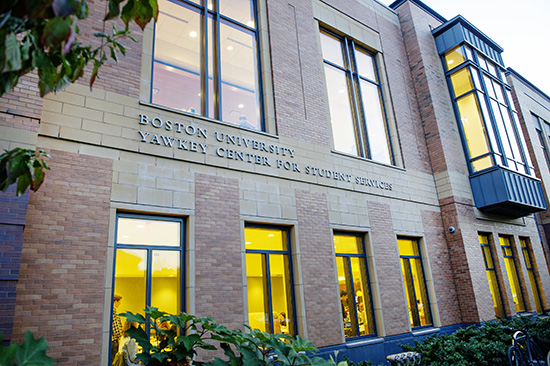Yawkey Foundations Gift Goes to Work
$10 million enables undergrads to intern at nonprofits nationwide

The Yawkey Nonprofit Internship Program is administered by the University’s Center for Career Development, housed in the Yawkey Center for Student Services. Photo by Jackie Ricciardi
This past summer, Benjamin St. Laurent had planned to spend his days at an unpaid internship at a local nonprofit and his nights working at a part-time job to pay his rent. Instead, the political science major was able to take a paying job and skip the night job entirely, thanks to the newly launched Yawkey Nonprofit Internship Program, which pays students to work for nonprofits that have no budget for interns. St. Laurent (CAS’17) worked at the nonprofit Environment Massachusetts.
“I think I went into the internship knowing about problems facing the environment, but I quickly was taught some of the solutions and spent my summer promoting them,” says St. Laurent, whose work for the advocacy group has influenced him to consider a minor in earth science. “I wrote a report highlighting some Massachusetts companies that are embracing ways to cut carbon emissions. The internship really made use of my political science major, because I got to go to the State House to attend hearings and meet the legislators.”
This summer, the Yawkey Nonprofit Internship Program provided stipends for 14 BU sophomores and juniors, all of whom were required to line up an internship with a nonprofit organization before applying. The program, which pays a stipend of $1,500 for an internship during the academic year and $3,000 for a summer internship, is funded by the Yawkey Foundations, which pledged $10 million in September 2014.
The late longtime Boston Red Sox owners Tom and Jean Yawkey had a relationship with BU dating to the early 1950s, when BU played all its football games at Fenway Park, and Terrier quarterback and baseball standout Harry Agganis (SED’54), “the Golden Greek,” signed with the Red Sox as a first baseman. Today, the Yawkey Foundations support improvements to health care, human services, and education. The Yawkey name can be found throughout Boston on hospital buildings, community centers, and most famously, on the street bordering Fenway Park.
The internships are administered by the University’s Center for Career Development (CCD), which is housed in the Yawkey Center for Student Services at 100 Bay State Road. Students selected for the program work closely with CCD staff to set goals and track their progress. Interns also write reflective essays on the impact the experience has had on their academic and career development.
“Our main goal is to connect students with internships in the nonprofit sector,” says Lauren Soares (CAS’13), the CCD Yawkey Internship program coordinator. “Because nonprofits may not have the ability to pay their interns, this program makes the opportunity possible for students who couldn’t afford to intern without being paid.”
Students in the inaugural group of Yawkey interns worked at organizations that include Press Pass TV, a Boston-based media job training program for teens, the International Institute of Minnesota, which works to resettle refugees as well as provide them with educational programs, and the Founders Clinic, which serves underserved populations in the Oregon City, Ore., area.
Under the terms of the new program, BU students can intern at any nonprofit in the Boston area during the academic year. Summer internships can be outside the Boston area, but must fit within one of the Yawkey Foundations’ six key issue areas: health care, education, human services, youth and amateur athletics, arts and culture, or conservation and wildlife.
To be considered, students must have a GPA of at least 2.5 and must attend two CCD workshops before applying: the career directions workshop (which introduces them to the career development cycle and helps them think about maximizing their time at BU and what they will do outside BU) and the self-discovery workshop (which helps them define their interests, values, and skills and identify a plan of action for choosing a major and a career). They must also attend a BU-funded internship program information session.
The aim of the program is to eventually have 80 to 100 sophomores and juniors enrolled each year.
“We’ve been hearing really positive feedback from both students and employers,” Soares says. “I’ve had students tell me that they are now considering jobs in the nonprofit field, which is exciting for us.”

Comments & Discussion
Boston University moderates comments to facilitate an informed, substantive, civil conversation. Abusive, profane, self-promotional, misleading, incoherent or off-topic comments will be rejected. Moderators are staffed during regular business hours (EST) and can only accept comments written in English. Statistics or facts must include a citation or a link to the citation.